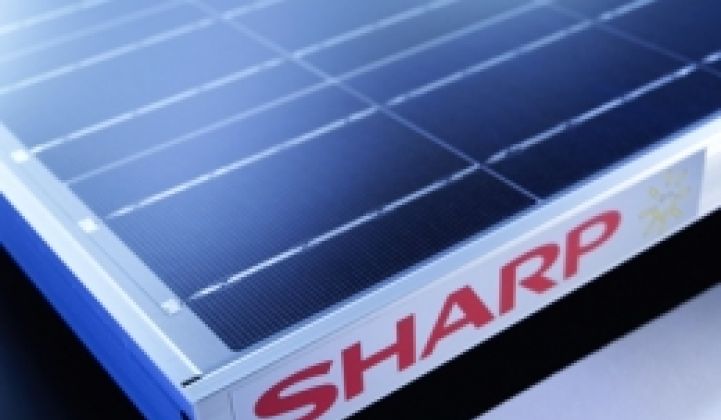A growing number of U.S. cities are creating incentives to make solar energy systems more affordable for its residents. San Francisco and Berkeley, for example, have won the national spotlight for such efforts. It took only 20 minutes for the city of Palm Desert to receive enough applications for its $1.25 million solar loan program today.
Tonight, Huntington Beach plans to be the next big municipal booster for solar energy, and it'll be rolling out a program what won't cost the city a dime.
The program, called HB Hometown Solar, will be completely funded by the Sharp Solar Energy Solutions Group. It's a rebate of $150 per kilowatt, for systems up to 10 kilowatt in size. And yes, you would have to use Sharp's solar panels to get the rebates.
The city council plans to announce the launch of the program and issue a proclamation that states the city's goal of installing 8.5 megawatts of solar within five years. Of the 8.5 megawatts, 4 megawatts would come from residential installations, 2.5 megawatts from city's own projects and 2 megawatts from commercial systems. Sharp's program would initially target the residential market.
At first glance, the city's promotion of Sharp's program would seem unfair for other makers of solar energy equipment. But the city said its process is no different than what it and other cities have done to promote local businesses – sales taxes make up a good chunk of a city's budget after all.
"We want local companies paying sales dollars in our jurisdiction," said Aaron Klemm, Huntington Beach's energy project manager.
It just so happen that Sharp's solar energy business in the United States is headquartered in Huntington Beach. It's also the only energy equipment business based in this seaside town of 200,000, Klemm said.
The Los Angeles Department of Water and Power (LADWP) has offered a similar type of promotion, and the only LA-based solar energy equipment manufacturer that qualified was Shell Solar, Klemm added. Shell Solar sold its manufacturing business to SolarWorld in 2006, and SolarWorld has kept Shell's factory in Camarillo, Calif.
The LADWP's program isn't restricted only to locally based equipment makers, but it does offer a higher rebate for systems that must be at least partly manufactured/assembled in LA (see rules on page 43 of the program guideline).
Huntington Beach has set up a website to tout Sharp's program. Residents can fill out a questionnaire and get from Sharp a referral to a local installer.
For now, Sharp is committed to offer the rebates for this year. Sharp said its goal is to install 100 systems through the program by the end of this year.
The average residential system has 3 kilowatts in generation capacity, and Sharp's incentives could shave 2 percent off the costs of buying and installing a system, according to the city website. Homeowners would still be eligible to get the state rebate and the 30 percent federal investment tax credit.
Klemm said Huntington Beach isn't only promoting Sharp. On the city's website, residents can find a list of installers that could be offering other companies' panels, he said.
But to get to the list of installers, which are listed under a state-run solar rebate website, will take several clicks.
Although the city isn't offering the rebates, it is providing other incentives for renewable energy projects. For example, it's waiving building permit fees for installing solar and energy efficient appliances. That's a saving of $100 to $500 per permit, Klemm said.
By Sharp's account, Huntington Beach has 47 residential and small commercial solar energy systems totaling 227 kilowatts. Besides those, there also is a 30-kilowatt commercial system.
Join experts and influencers at Greentech Media's Growth Opportunities in the New PV Market: Projects, Finance and Policy in San Francisco on July 13.




